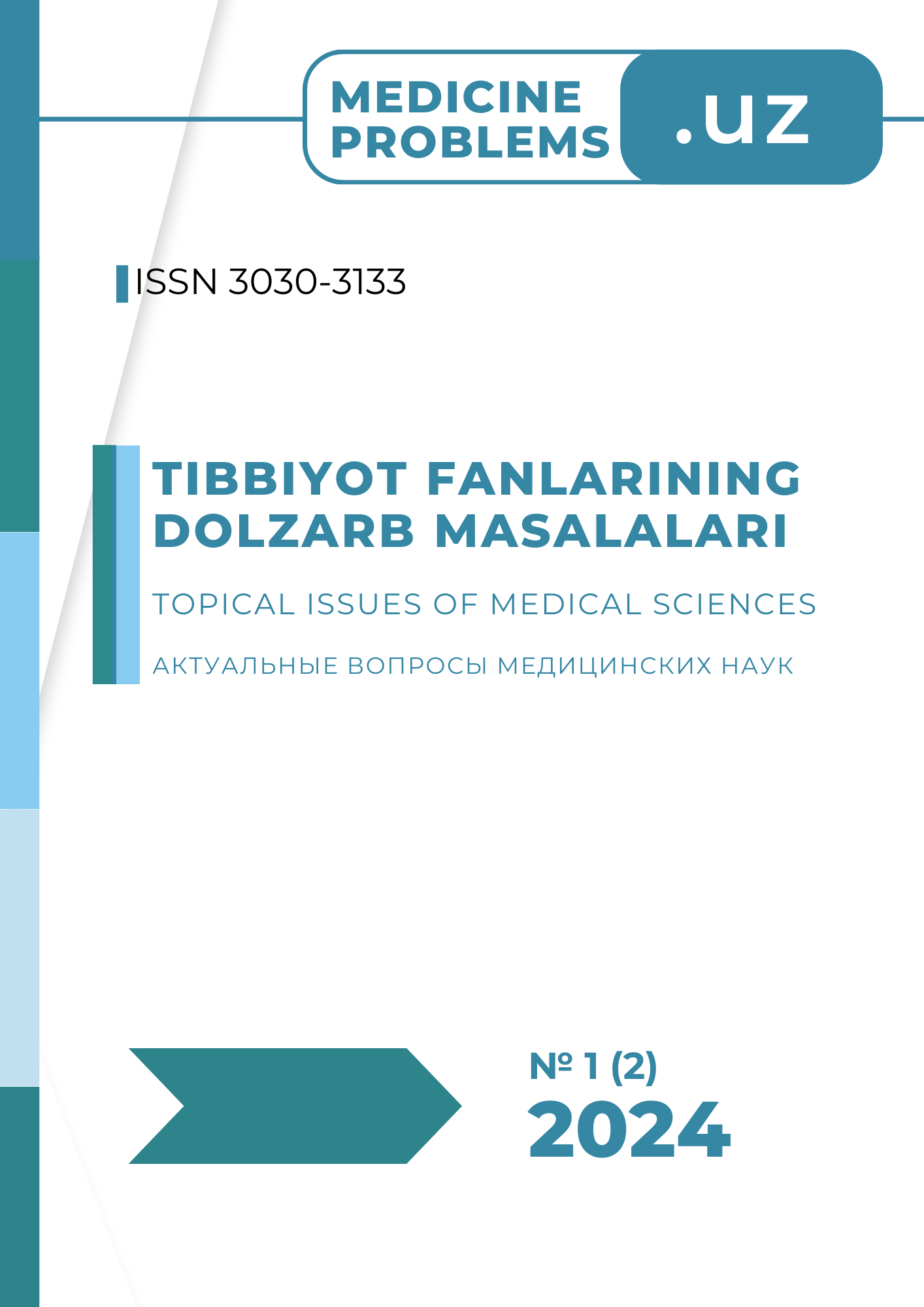СОН И ИНСУЛЬТ. ОСОБЕННОСТИ ВОЗНИКНОВЕНИЯ И ТЕЧЕНИЯ
Kalit so'zlar
https://doi.org/10.47390/3030-3133V2I1Y2024N03Kalit so'zlar
инсульт, сон, нарушения сна, нарушение дыхания во сне, центральное апноэ во сне, обструктивное апноэ во сне.Annotasiya
Цереброваскулярные заболевания, такие как ишемические и геморрагические инсульты, являются одними из ведущих причин инвалидности и смертности во всем мире. Данные показывают нам, что выявление и лечение нарушений сна должно производиться как в первичной, так и во вторичной профилактики инсульта. Сон и инсульт часто переплетаются, поскольку нарушения сна, включая нарушения дыхания во сне, парасомнии, двигательные расстройства, связанные со сном, бессонницу и гиперсомнию, тесно связаны с сопутствующими сердечно-сосудистыми заболеваниями и повышают риск инсульта. Нарушения сна после инсульта также могут повлиять на реабилитацию после инсульта и качество жизни, а при отсутствии лечения могут привести к повторным инсультам.
Manbalar
Маджидова Е.Н., Мухаммадсолих Ш.Б., Турабоев О.О., Рахимов Ф.Ж., Абдуллаев З.Х. Эпидемиология и основные факторы риска инсульта в кашкадарьинской области
«НОВЫЙ ДЕНЬ В МЕДИЦИНЕ» ISSN: 2181-712X. Номер: 2 (26) Год: 2019 Страницы: 203-206. Поступила в редакцию: 02.03.2019 УДК: 616-004.-831
Argentino C, Toni D, Rasura M, et al. Circadian variation in the frequency of ischemic stroke. Stroke 1990; 21:387-9. 10.1161/01.STR.21.3.387
Arzt M, Young T, Finn L, Skatrud JB, Bradley TD. Association of sleep-disordered breathing and the occurrence of stroke. Am J Respir Crit Care Med. 2005; 172:1447–1451
Bassetti CLA, Randerath W, Vignatelli L, et al. EAN/ERS/ESO/ESRS statement on the impact of sleep disorders on risk and outcome of stroke. Eur J Neurol 2020; 27:1117-36. 10.1111/ene.14201
Brooks D, Horner RL, Kozar LF, et al. Obstructive sleep apnea as a cause of systemic hypertension. Evidence from a canine model. J Clin Invest 1997; 99:106-9. 10.1172/JCI119120
Brown DL, Jiang X, Li C, Case E, Sozener CB, Chervin RD, et al. Sleep apnea screening is uncommon after stroke. Sleep Med. 2018. 10.1016/j.sleep.2018.09.009. Accessed March 15, 2019
Dong JY, Zhang YH, Qin LQ. Obstructive sleep apnea and cardiovascular risk: Meta- analysis of prospective cohort studies. Atherosclerosis. 2013;229:489–495
Duss SB, Seiler A, Schmidt MH, et al. The role of sleep in recovery following ischemic stroke: a review of human and animal data. Neurobiol Sleep Circadian Rhythms 2016; 2:94-105. 10.1016/j.nbscr.2016.11.003
Eckert DJ, Malhotra A, Jordan AS. Mechanisms of apnea. Prog Cardiovasc Dis. 2009;51:313–323
Elliott WJ. Circadian variation in the timing of stroke onset: a meta-analysis. Stroke 1998; 29:992-6. 10.1161/01.STR.29.5.992
Fink JN, Kumar S, Horkan C, et al. The stroke patient who woke up: clinical and radiological features, including diffusion and perfusion MRI. Stroke 2002; 33:988-93. 10.1161/01.STR.0000014585.17714.67
Hermann DM, Siccoli M, Kirov P, Gugger M, Bassetti CL. Central periodic breathing during sleep in acute ischemic stroke. Stroke. 2007;38:1082–1084
Huisa BN, Liebeskind DS, Raman R, el al; University of California, Los Angeles Stroke Investigators. Diffusion-weighted imaging-fluid attenuated inversion recovery mismatch in nocturnal stroke patients with unknown time of onset. J Stroke Cerebrovasc Dis 2013; 22:972-7. 10.1016/j.jstrokecerebrovasdis.2012.01.004
Javaheri S, Barbe F, Campos-Rodriguez F, Dempsey JA, Khayat R, Javaheri S, et al. Sleep apnea: Types, mechanisms, and clinical cardiovascular consequences. J Am Coll Cardiol. 2017;69:841–858
Johnson KG, Johnson DC. Frequency of sleep apnea in stroke and tia patients: A meta- analysis. J Clin Sleep Med. 2010; 6:131–137 10.5664/jcsm.27760
Lago A, Geffner D, Tembl J, et al. Circadian variation in acute ischemic stroke: a hospital- based study. Stroke 1998; 29:1873-5. 10.1161/01.STR.29.9.1873
Lanfranchi PA, Somers VK, Braghiroli A, et al. Central sleep apnea in left ventricular dysfunction: prevalence and implications for arrhythmic risk. Circulation 2003; 107:727-
10.1161/01.CIR.0000049641.11675.EE
Leng Y, Cappuccio FP, Wainwright NW et al. Sleep duration and risk of fatal and nonfatal stroke: A prospective study and meta-analysis. Neurology. 2015, 84: 172-179.
Marler JR, Price TR, Clark GL, et al. Morning increase in onset of ischemic stroke. Stroke 1989; 20:473-6. 10.1161/01.STR.20.4.473
Marshall J. Diurnal variation in occurrence of strokes. Stroke 1977; 8:230-1. 10.1161/01.STR.8.2.230
Murali NS, Svatikova A, Somers VK. Cardiovascular physiology and sleep. Front Biosci 2003;8: s636-52. 10.2741/1105
Narrative review of sleep and stroke Laura Pérez-Carbonellcorresponding and Saima Bashir J Thorac Dis. 2020 Oct; 12(Suppl 2): S176–S190. doi: 10.21037/jtd-cus-2020-002 PMCID: PMC7642629 PMID: 33214922
Nopmaneejumruslers C, Kaneko Y, Hajek V, et al. Cheyne-Stokes respiration in stroke: relationship to hypocapnia and occult cardiac dysfunction. Am J Respir Crit Care Med 2005; 171:1048-52. 10.1164/rccm.200411-1591OC
Parra O, Arboix A, Bechich S, Garcia-Eroles L, Montserrat JM, Lopez JA, et al. Time course of sleep-related breathing disorders in first-ever stroke or transient ischemic attack. Am J Respir Crit Care Med. 2000;161:375–380
Redline S, Yenokyan G, Gottlieb DJ, Shahar E, O’Connor GT, Resnick HE, et al. Obstructive sleep apnea-hypopnea and incident stroke: The sleep heart health study. Am J Respir Crit Care Med. 2010;182:269–277
Siccoli MM, Valko PO, Hermann DM, Bassetti CL. Central periodic breathing during sleep in 74 patients with acute ischemic stroke - neurogenic and cardiogenic factors. J Neurol. 2008;255:1687–1692
Sleep and Stroke Sandeep Khot, MD1 and Lewis B. Morgenstern, MD2. Stroke. Author manuscript; available in PMC 2020 Jun 1. Published in final edited form as: Stroke. 2019 Jun; 50(6): 1612–1617. Published online 2019 May 2. doi: 10.1161/STROKEAHA.118.023553
Somers VK, Dyken ME, Mark AL, et al. Sympathetic-nerve activity during sleep in normal subjects. N Engl J Med 1993; 328:303-7. 10.1056/NEJM199302043280502
Stevens D, Martins RT, Mukherjee S, et al. Post-stroke sleep-disordered breathing- pathophysiology and therapy options. Front Surg. 2018; 5:9. 10.3389/fsurg.2018.00009
van der Windt C, van Gijn J. Cerebral infarction does not occur typically at night. J Neurol Neurosurg Psychiatry 1988; 51:109-11. 10.1136/jnnp.51.1.109
Wroe SJ, Sandercock P, Bamford J, et al. Diurnal variation in incidence of stroke: Oxfordshire community stroke project. BMJ 1992; 304:155-7. 10.1136/bmj.304.6820.155
Yaggi HK, Concato J, Kernan WN, Lichtman JH, Brass LM, Mohsenin V. Obstructive sleep apnea as a risk factor for stroke and death. N Engl J Med. 2005;353:2034–2041.



